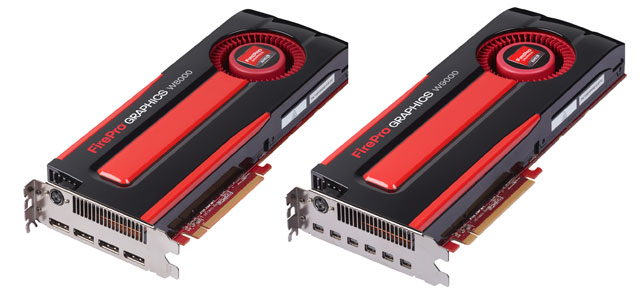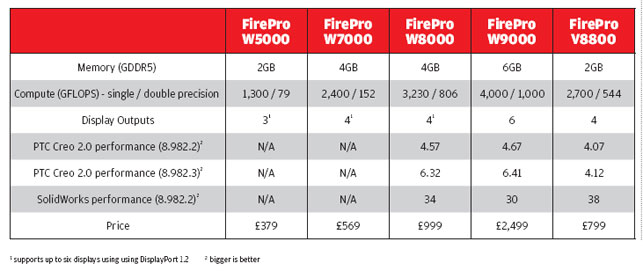Forget overpriced holidays and rained off barbeques, you know it’s summer when AMD unveils a new family of professional graphics cards. Timed to coincide with SIGGRAPH, the legendary computer graphics event, AMD’s new products now come around like the seasons.

This August SIGGRAPH witnessed the introduction of a brand new family of boards, the AMD FirePro W Series and with them a change in direction for AMD’s professional graphics division. AMD FirePro is no longer just about professional 3D graphics. It’s now serious about GPU compute as well.
There are currently four cards in the FirePro W Series family. The FirePro W5000 (2GB) and W7000 (4GB) are designed for mid-range CAD and will replace the FirePro V5900 (2GB) and V7900 (2GB).
The FirePro W8000 (4GB ECC) and W9000 (6GB ECC) will replace the FirePro V8800 (2GB) and V9800 (4GB) and are targeted more at high-end CAD, visualisation and GPU compute.
There’s no word on any entry-level boards yet, but we expect some to materialise later this year or early 2013.
All of the new FirePro W Series cards are based on AMD’s ‘Southern Islands’ 28nm GPU architecture, which AMD calls Graphics Core Next (GCN). GCN boasts an expected boost in clock speed and stream processing units, but also a number of new features.
Firstly, it is designed to use GPU cores more efficiently. AMD explains how GCN is able to extract more performance out of a given number of processing units, adding that the GPU cores on its previous generation FirePro cards were often under-utilised.
Secondly, a new power feature, AMD Powertune, increases clock speed to boost performance. It works by continuously monitoring how the GPU is utilised and, wherever possible, dynamically increases clock speeds, while keeping the card within its Thermal Design Power (TDP).
This works on the principle that most real world CAD applications don’t use all of the available processing power in a graphics card.
While all this happens under the hood, both features are likely to have played a role when we put the FirePro W8000 and W9000 through their paces in PTC Creo 2.0.
We tested with two different sets of drivers: 8.982.2, which is Windows Hardware Quality Labs (WHQL) certified and 8.982.3, a so called performance driver which has not yet had the WHQL seal of approval from Microsoft’s testing engineers.
With the 8.982.2 driver, our tests showed a 12% improvement moving from the FirePro V8800 to the FirePro W8000. But when the 8.982.3 driver was introduced, which includes specific optimisations for the new cards, the difference went up to a colossal 37%.
Testing with SolidWorks 2010 showed a very different picture. By default, all current versions of SolidWorks are unable to recognise any FirePro W Series card as ‘professional’ level.
This is because they don’t have the same hardware ID as the previous generation, FirePro V Series, which were on sale when the software was written. As a result, SolidWorks treats the new cards like a bog standard GPU, without any driver optimisations whatsoever. This makes them slower than the FirePro V8800.

Comaprison of FirePro W series cards
This performance mismatch should be sorted soon, with a patch or a SolidWorks service pack. Nvidia experienced similar problems when the ‘FX’ was dropped from Nvidia’s Quadro cards in 2010.
GPU Compute
For those looking to use their GPU for more than just graphics, the big news is that AMD FirePro is now focusing more on GPU compute with all new cards tuned for both.
With good double precision performance and ECC memory, the high-end W8000 and W9000 in particular looks to be well suited to simulation, while all cards should offer something for ray trace rendering.
But with application support still limited, this technology is more one for the future. We expect more OpenCL accelerated applications (the programming framework supported by AMD FirePro) to appear next year. We cover this in much more detail in our in-depth GPU compute article on page 49.
Conclusion
If our first look at AMD’s FirePro W Series cards taught us one thing, it’s the importance of driver optimisations. The new GCN architecture has proved it can do wonders for Creo 2.0, but SolidWorks users will have to wait to see its true potential.
Our test cards for this article, the high-end FirePro W8000 and W9000, aren’t typical GPUs for CAD, instead more suited to high-end design viz or for use on powerwalls. But AMD’s increased focus on GPU compute could broaden their appeal.
Indeed, at £999 the W8000 in particular could catch the eye of CAD users who want more compute power to accelerate OpenCL rendering and simulation applications.
Previously AMD’s mid range W5000 and W7000 would have been a perfect fit for most design and engineering workflows, but GPU compute could change the way CAD users look at GPUs.






